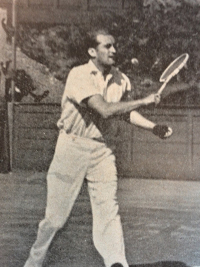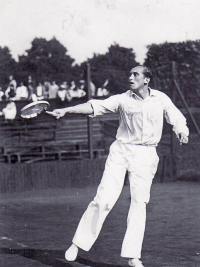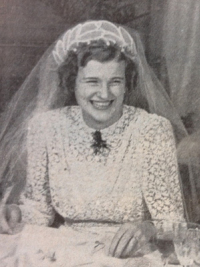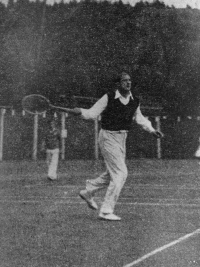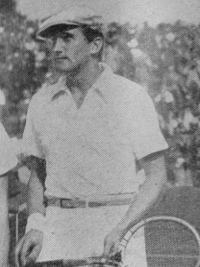Roderich Menzel
Full name: Roderich Ferdinand Ottomar Menzel
| Born |
Subscribe now
This information and data is not available because you are not our subscriber yet.
Please click here and get full access to the entire database! |
|---|---|
| Died | |
| Height | |
| Weight | |
| Plays | |
| Coach | |
| Latest NEWS | Click here to read latest news on |
| Bio | Roderich Menzel was born in Reichenberg (Liberec), Bohemia, an advanced industrial city of Austria-Hungary Empire. He lived with his parents and two brothers in a three-storey house in Römheldstraße 7 (Tatranská street these days). His father Ernst, who was born in the family of glassworks manager in the mountain village Wilhelmshöhe, rose from a correspondent to the position of a partner of cable manufacturer Felten & Guilleaume's North Bohemia office. During his studies at a business high school he started to playing a football as a goalkeeper for RSK Reichenberg – at the age of 16 (1923) he joined the senior team. Looking back on his goalkeeper career Menzel often gave a good funny story about his great idol, goalkeeper of RSK Reichenberg, Ende. As is usual, home team goalkeeper's name always appeared at the very end of both team rosters in the home programme but in this case people often thought that at that point the programme actually ends. But as he was playing tennis at same level as a football, an important decision had to be made. He chose tennis and soon became a Czechoslovak junior champion (1925). Shortly before he had to cope with a large family tragedy, when his father died of a heart attack due to complicated double pneumonia. In 1928, Menzel first qualified for the main Wimbledon competition and also entered a Davis cup competition against Sweden. He immediately won his first two singles in his long successful Davis Cup career (61 wins/23 defeats), which in a history of the Czech (Czechoslovakian) Davis Cup team remains unsurpassed. Among his memorable Davis Cup performances belongs a couple of five set battles against Gottfried Von Cramm, his great rival at the time. Menzel also collected his trophies at other tournaments. In 1931, he won one of the most prestigious tournaments at the time, the German Open Tennis Championships, over Gustav Jaenecke and Monte-Carlo Masters just one year later, over George Rogers. Only few weeks later he achieved his big first Grand Slam result when he made it to the French Championships semifinals, where he lost to Giorgio de Stefani. His excellent form continued as he won over von Cramm in the semifinal and Jacques Brugnon in the final of the Rot-Weiß Club tournament in Berlin. Arrival of international tennis stars to compete in the summer 1934–1935 Australian tournaments. Menzel with his first wife Bucky on the right. His stable form Menzel also confirmed one year later, in 1933, when he was playing quarterfinals at the French Championships and Wimbledon. He reached the same result in 1934, narrowly losing against von Cramm at the French Championships and, in one of the most memorable matches of all time, to Fred Perry at Wimbledon. Things got better at the Czechoslovakian International Championships (against von Cramm) and Egypt International (against Pat Hughes), which he both won. What is more, he triumphed at the tournament in Cairo in following four years in a row. In 1934 he and Ladislav Hecht won the Butler Trophy of Monte Carlo, defeating Jacques Brugnon and Jean Lesueur in the final.[2] A. Wallis Myers of The Daily Telegraph ranked Menzel as the World No. 7 for 1934.[1] There was no exception in 1935, when Menzel again finished his participation in Grand Slam tournaments in the quarter-finals, at the US Championships even in the fourth round. But at the same place he teamed up with Kay Stammers to be the Mixed Doubles runner-up, losing in the finals to Sarah Palfrey / Enrique Maier. A major achievement was reaching the final at the Pacific Southwest Tournament in Los Angeles same year, where he was beaten by Don Budge. But it was for long time Menzel's latest success. In 1936, he suffered couple of breakdowns which resulted in serious heart problems. For more than a year he was forced to reconvalesce. He spent nearly one year in Bad Gräfenberg (now Lázně Jeseník) where he received most of the treatments. The first symptoms of Menzel's health problems appeared in the quarter-finals of the French Championships, when he played against Bunny Austin, No. 2-ranked player in the world that time. He was leading 2–1 in sets but, while changing sides, he made a mistake and took a sip from his opponent's glass. To his unpleasant surprise, it was a gin instead of water. Vision problems and hallucinations immediately followed and Menzel lost the match. He did not pay too much attention to it until the Davis Cup final a few weeks later, when he played a crucial match of the whole series against von Cramm. The famous German already had two match points in the fourth set, but Menzel managed to avert the threat and won the set 7–5 to tie the match at 2–2. After Menzel won the first game of the fifth set and von Cramm continued to suffer, he received a strange offer at his home bench while changing sides. 'It will strengthen you' said President of the Czech Tennis Association and handed Menzel a glass of champagne! Menzel still managed to nearly win the second game of the fifth set, but once he started to see blurry sidelines, he knew that it was over. He lost the final set 1–6. Menzel was back in 1937, but his early defeat at Wimbledon (first round) suggests that his comeback would not be that easy. A much better situation was in the doubles, where he managed (with Ladislav Hecht) to get into the semi-finals. Everything was forgiven one year later, when Menzel was the men's singles runner-up at the French Open, losing in the final against Budge. His biggest success of all time was a little bit reduced by an absence of great players such as von Cramm or Perry. In September 1938, on the basis of the Munich Agreement, it was decided that Czechoslovakia had to lose a part of its territory (Sudetenland) to Nazi germany. Menzel, who was born and spent his childhood in Reichenberg, now the capital of a new German state, became also a German citizen. In May 1939, only a few months later, he already played for his new homeland, Germany, in the Davis Cup. After the outbreak of World War II, Menzel started working as a journalist in a foreign broadcast of Großdeutscher Rundfunk. Unlike his other colleagues in the team (Henner Henkel was killed at Battle of Stalingrad, von Cramm was wounded on the Eastern Front) Menzel didn't have to go to the front, and spent the war years in the relative safety of Berlin (he lived in the Bavarian Quarter, Güntzelstraße 4). After the war, Menzel tried to build on his pre-war tennis achievements, but with the exception of a few victories in tournaments of only regional significance, his career came to an end. Roderich Menzel had at that time an unusually tall physique (6 ft 3in), which directly predetermined him to a serve and volley style of play. He was also notorious for his fierce temper – he refused to play until the nearby bells stopped ringing or a child stopped crying in the stands. Menzel also loved often to passionately „discuss" with the judge and spectators. The spectators at the stadium of the Italian tennis championships in Rome annoyed him to such an extent that he went off the court and never came back. Although Menzel failed to win any Grand Slam tournaments, his achievements in the Davis Cup and at the most prestigious international tournaments rank him among the world tennis elite of the time. |
| Misc | Subscribe now |
| Tournament | AO | RG | W | US | Win-Loss |
|---|---|---|---|---|---|
|
Subscribe now
This information and data is not available because you are not our subscriber yet.
Please click here and get full access to the entire database! |
|||||
